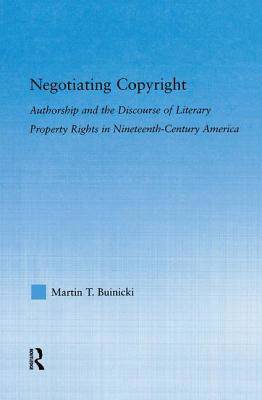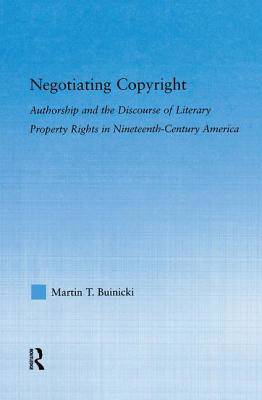
Je cadeautjes zeker op tijd in huis hebben voor de feestdagen? Kom langs in onze winkels en vind het perfecte geschenk!
- Afhalen na 1 uur in een winkel met voorraad
- Gratis thuislevering in België vanaf € 30
- Ruim aanbod met 7 miljoen producten
Je cadeautjes zeker op tijd in huis hebben voor de feestdagen? Kom langs in onze winkels en vind het perfecte geschenk!
- Afhalen na 1 uur in een winkel met voorraad
- Gratis thuislevering in België vanaf € 30
- Ruim aanbod met 7 miljoen producten
Zoeken
Negotiating Copyright
Authorship and the Discourse of Literary Property Rights in Nineteenth-Century America
Martin T Buinicki
€ 74,95
+ 149 punten
Uitvoering
Omschrijving
This book examines how debates over copyright law in the United States during the nineteenth century, particularly over the lack of an international copyright law, intersected with the business practices and political and artistic beliefs of American authors. These debates shaped a discourse of literary property rights that forced authors to negotiate their copyrights not only with their publishers, but with their readers as well. The author argues that the act of taking out a copyright was more than a mere legal mechanism marking a transition from amateur to professional or artist to businessperson. Taking out a copyright had a profound impact on how audiences viewed authors, how authors perceived their profession, and how they represented individual rights and property ownership within their texts. The book is unique in the scope of its research, tracking developments from the 1820s through the 1890s, and in the way it approaches the work and careers of well-known authors. The author employs research from the American Antiquarian Society, the Harriet Beecher Stowe Center, and the Government and Special Collections at the University of Iowa, drawing on an array of documents including newspaper editorials, legislative hearings, court decisions, and the public and private writing of James Fenimore Cooper, Walt Whitman, Harriet Beecher Stowe, Samuel Clemens, and Emily Dickinson to demonstrate how authors found themselves in an uneasy opposition to their reading public.
Specificaties
Betrokkenen
- Auteur(s):
- Uitgeverij:
Inhoud
- Aantal bladzijden:
- 248
- Taal:
- Engels
- Reeks:
Eigenschappen
- Productcode (EAN):
- 9780415762823
- Verschijningsdatum:
- 23/04/2015
- Uitvoering:
- Paperback
- Formaat:
- Trade paperback (VS)
- Afmetingen:
- 150 mm x 226 mm
- Gewicht:
- 362 g

Alleen bij Standaard Boekhandel
+ 149 punten op je klantenkaart van Standaard Boekhandel
Beoordelingen
We publiceren alleen reviews die voldoen aan de voorwaarden voor reviews. Bekijk onze voorwaarden voor reviews.









